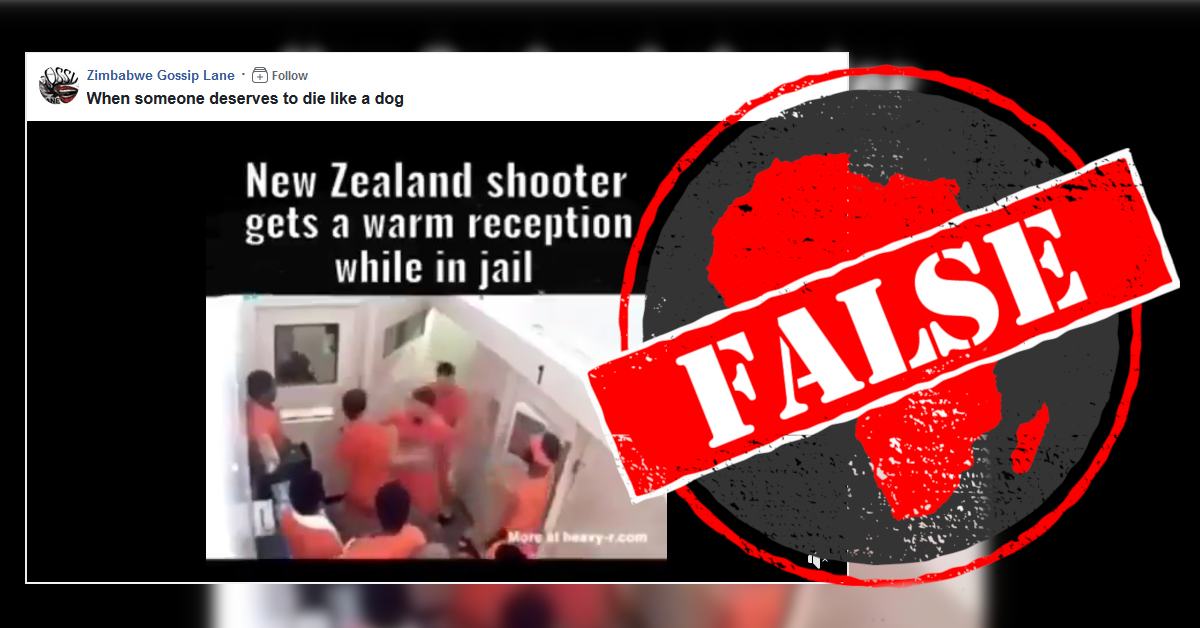A 56-second video circulating on Facebook shows men dressed in orange prison overalls beating up another male prisoner. It’s captioned: “New Zealand shooter gets a warm reception in jail.”
The suggestion is that the victim is Brenton Tarrant, who shot to death 50 Muslim worshippers at a mosque in Christchurch on 15 March 2019. The video has been posted on Facebook pages across the world, including in Nigeria and Zimbabwe.

One post from Indonesia, uploaded on 22 March 2019, was shared about 850 times and viewed more than 250,000 times.
A fact-check by global news agency AFP’s Indonesia office tracked the video to Canada.
AFP took a screenshot of one of the video frames and loaded it into Yandex reverse image search. This took them to Canadian news outlets, which posted the video in 2015.
A Google search using the keywords “prisoner being beaten in jail” also gives results from 2015. One is a story on the Canadian Global News published on 10 September 2015.
According to Canadian Broadcasting Corporation (CBC) news, the beating took place in Ottawa in March 2015.
The video, released to a Canadian court, shows Carlos Larmond being beaten by two other inmates. Larmond and his co-accused brother Ashton Larmond were facing “terrorism-related charges”.
The Global News article says the beating took place at the Ottawa-Carleton Detention Centre.
This is a case of misinformation, which can blur the actual facts of important events and issues. We all need to stop and think before sharing unverified information on Facebook.
Africa Check’s How to stop falling for fake news factsheet helps users spot false and misleading information on the internet as a whole. Facebook also encourages users to flag fake news they find on their feeds. – Africa Check (23/04/19)
The suggestion is that the victim is Brenton Tarrant, who shot to death 50 Muslim worshippers at a mosque in Christchurch on 15 March 2019. The video has been posted on Facebook pages across the world, including in Nigeria and Zimbabwe.

Was the New Zealand shooter beaten in jail?
One post from Indonesia, uploaded on 22 March 2019, was shared about 850 times and viewed more than 250,000 times.
A fact-check by global news agency AFP’s Indonesia office tracked the video to Canada.
AFP took a screenshot of one of the video frames and loaded it into Yandex reverse image search. This took them to Canadian news outlets, which posted the video in 2015.
A Google search using the keywords “prisoner being beaten in jail” also gives results from 2015. One is a story on the Canadian Global News published on 10 September 2015.
Terror suspect beaten in Ottowa jail
According to Canadian Broadcasting Corporation (CBC) news, the beating took place in Ottawa in March 2015.
The video, released to a Canadian court, shows Carlos Larmond being beaten by two other inmates. Larmond and his co-accused brother Ashton Larmond were facing “terrorism-related charges”.
The Global News article says the beating took place at the Ottawa-Carleton Detention Centre.
How to spot fakes online
This is a case of misinformation, which can blur the actual facts of important events and issues. We all need to stop and think before sharing unverified information on Facebook.
Africa Check’s How to stop falling for fake news factsheet helps users spot false and misleading information on the internet as a whole. Facebook also encourages users to flag fake news they find on their feeds. – Africa Check (23/04/19)
Republish our content for free
For publishers: what to do if your post is rated false
A fact-checker has rated your Facebook or Instagram post as “false”, “altered”, “partly false” or “missing context”. This could have serious consequences. What do you do?
Click on our guide for the steps you should follow.
Publishers guideAfrica Check teams up with Facebook
Africa Check is a partner in Meta's third-party fact-checking programme to help stop the spread of false information on social media.
The content we rate as “false” will be downgraded on Facebook and Instagram. This means fewer people will see it.
You can also help identify false information on Facebook. This guide explains how.





Add new comment